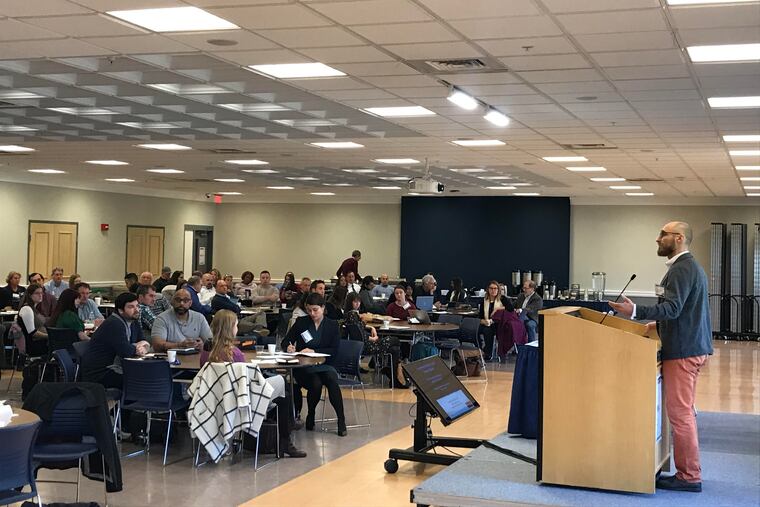Pa. is treating more opioid overdoses as homicides. Defense lawyers are learning to fight back.
Harm-reduction advocates say such harsh punishments hearken back to failed War on Drugs-era policies that criminalize drug use instead of treating it.

As the opioid epidemic has spiraled, Pennsylvania has led the nation in prosecuting overdose deaths as homicides, bringing charges against people accused of supplying the fatal dose of drugs. Often, the targets are not major dealers, but drug users who shared with a friend.
Now, defense lawyers from around the state are learning how to help their clients navigate these once-obscure cases.
The charge — known in Pennsylvania as “drug delivery resulting in death” (DDRD) — has become a favorite tool of prosecutors as overdoses have spiked. Under the statute, people who sell or give drugs to someone who then dies of an overdose can face a prison term of 20 to 40 years.
Prosecutors have praised it as a tool to combat overdoses, give grieving families justice, and go after large-scale dealers.
But many harm-reduction advocates say such harsh punishment harks back to failed War on Drugs-era policies that criminalize drug use instead of treating it. What’s more, they say, prosecutors are often leveling the charge against drug users and low-level dealers, not kingpins.
This month in Harrisburg, the National Association of Criminal Defense Lawyers, Northeastern University’s Health in Justice Action Lab, and Vital Strategies — the health organization working to cut overdoses in the state with a $10 million grant from Bloomberg Philanthropies — hosted a training session for defense lawyers who are fielding more and more DDRD cases.
Pennsylvania, organizers said, was a natural place to start: A quarter of the drug-induced homicide cases filed nationwide between 2000 and 2017 were brought in the commonwealth, according to data sourced from media reports gathered by the Health in Justice lab.
Between 2000 and 2017, 664 DDRD cases were filed in Pennsylvania. Prosecutors in Ohio, with the second-highest number of drug-induced homicide cases, filed 385 in that period.
“Pennsylvania is ground zero for these kinds of prosecutions,” said Leo Beletsky, a public-health law professor at Northeastern and a critic of drug-induced homicide laws, who helped host the training. National data, he says, belie much of the prosecutorial narrative surrounding these laws.
Across the nation, about 47% of the people charged with drug-induced homicide between 2000 and 2017 fit the typical profile of a drug dealer — people who make their living selling narcotics — according to the Health in Justice lab’s research. Several defense lawyers at Wednesday’s session said, though, that many of the dealers who end up charged under the statute are low-level.
Family, friends, or caretakers of an overdose victim accounted for 50% of the charges, and 3% were doctors.
“The largest proportion of people who are prosecuted under DDRD are not traditionally defined as dealers. They’re not only not big fish, they’re arguably not fish at all,” Beletsky said. Threats of a long prison sentence, he said, are enough to make some drug users afraid to call for help if a friend overdoses.
» READ MORE: Montco woman, 24, is sentenced to 21 years in prison for friend’s heroin overdose death
The national data also highlight racial disparities in the courts, he added. White defendants charged with drug-induced homicide tend to receive significantly lower sentences than their minority counterparts.
“After we started putting information out about our finding, something we started getting a lot of were lawyers and loved ones of people charged under these charges reaching out and saying, ‘We’re at a loss, the prosecutors are throwing the book at us,’” Beletsky said.
For Pennsylvania defense lawyers, defending a client against a DDRD charge can be difficult, largely because of a 2011 change in state law that demoted DDRD from a murder charge to a first-degree felony. This made prosecutors’ job easier, as all they have to prove in court is that defendants sold or gave the overdose victim the fatal dose, not that they intended to kill them.
The training sought to give defense lawyers a primer on how to challenge cases in court. That might mean scrutinizing toxicology results, which often show multiple drugs in an overdose victim’s system, as well as hiring experts for the courtroom, and challenging prosecutors to prove the defendant really sent texts or other communications to the overdose victim.
“It’s also important a jury know and understand that your client may very well have a substance-use disorder themselves. That they’re not drug kingpins,” said Carrie Allman, a public defender in Montgomery County who spoke at the training.
In a jury trial over a DDRD case, she said, a defense lawyer’s duty is to the client. Outside the courtroom, though, she said, defenders should take on a broader role and speak up more about the concept of drug-induced homicide charges.
“We have a duty and an obligation to start speaking out, gathering support from community members, and educating the community about what this statute is accomplishing and not accomplishing,” she said.